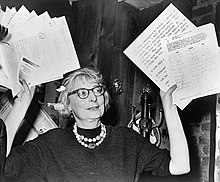Jane Jacobs
|
Jane Jacobs OC OOnt |
|
|---|---|

Jane Jacobs as chairperson of a Greenwich Village civic group at a 1961 press conference
|
|
| Born |
Jane Butzner May 4, 1916 Scranton, Pennsylvania, U.S. |
| Died | April 25, 2006 (aged 89) Toronto, Ontario, Canada |
| Residence |
Greenwich Village, New York City The Annex, Toronto |
| Education | Graduated from Scranton High School; two years of undergraduate studies at Columbia University |
| Occupation | Journalist, author, urban theorist |
| Employer | Amerika, Architectural Forum |
| Organization | Joint Committee to Stop the Lower Manhattan Expressway, Stop Spadina Save Our City Coordinating Committee |
| Notable work | The Death and Life of Great American Cities |
| Spouse(s) | Robert Jacobs |
| Awards | OC, OOnt, Vincent Scully Prize, National Building Museum |
Jane Jacobs OC OOnt (born Jane Butzner; May 4, 1916 – April 25, 2006) was an American-Canadian journalist, author, and activist best known for her influence on urban studies. Her influential book The Death and Life of Great American Cities (1961) argued that urban renewal did not respect the needs of most city-dwellers. The book also introduced sociological concepts such as "eyes on the street" and "social capital".
Jacobs was well known for organizing grassroots efforts to protect existing neighborhoods from "slum clearance" – and particularly for her opposition to Robert Moses in his plans to overhaul her neighborhood, Greenwich Village. She was instrumental in the eventual cancellation of the Lower Manhattan Expressway, which would have passed directly through SoHo and Little Italy, and was arrested in 1968 for inciting a crowd at a public hearing on the project. After moving to Toronto in 1968, she joined the opposition to the Spadina Expressway and the associated network of expressways in Toronto planned and under construction.
As a mother and a writer who criticized experts in the male-dominated field of urban planning, Jacobs endured scorn from established figures. She did not have a college degree or any formal training in urban planning, and was criticized for lacking such credentials.
...
Wikipedia
